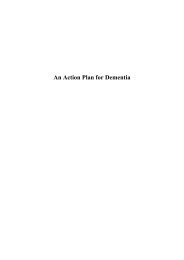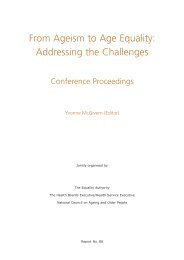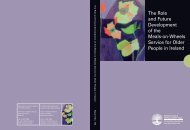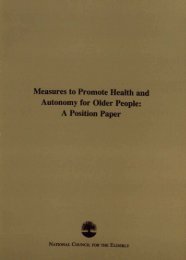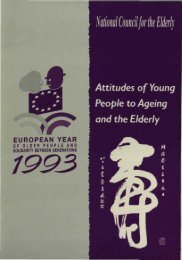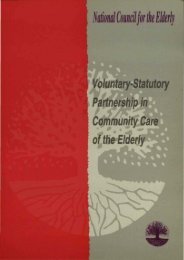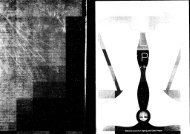Assessment of Older People's Health and Social Care Needs and ...
Assessment of Older People's Health and Social Care Needs and ...
Assessment of Older People's Health and Social Care Needs and ...
- No tags were found...
Create successful ePaper yourself
Turn your PDF publications into a flip-book with our unique Google optimized e-Paper software.
St<strong>and</strong>ard <strong>Assessment</strong>The st<strong>and</strong>ard psychiatric assessment is carried out by one <strong>of</strong> the medical members <strong>of</strong> the multidisciplinaryteam, with further assessment by other members <strong>of</strong> the team as required. This mightinclude input from some or all <strong>of</strong> nursing, psychology, social work <strong>and</strong> occupational therapy members<strong>of</strong> the team. The emphasis is on domiciliary assessment because it gives a more accurateassessment <strong>of</strong> the individual's cognitive function, an opportunity to assess the home circumstances<strong>and</strong> time to interview the carer. Collateral history is gathered from relevant sources, including thecarer, the family, the GP, ward staff if applicable, <strong>and</strong> home help.A history is taken from the patient in an individual interview. There we look at the patient'sperception <strong>of</strong> the problem, its history, duration, mode <strong>of</strong> onset <strong>and</strong> precipitating factors. We look atpast psychiatric history, relevant medical history, medication <strong>and</strong> alcohol use. The patient's socialsituation <strong>and</strong> supports are explored, as is his or her personal history.A mental state examination is conducted. This is a st<strong>and</strong>ard assessment used with younger peoplealso. With older people we assess particular areas, including appearance, behaviour, speech,hearing/sight loss, mood, thought (for example, the presence or absence <strong>of</strong> delusions) <strong>and</strong>perception (e.g. visual or auditory hallucinations).For cognitive assessment, various tools can be used. One <strong>of</strong> the most common is the Mini MentalState Examination. This looks at orientation, language, memory <strong>and</strong> praxia. In addition, a tool forassessing dependency such as the CAPE can be a useful adjunct to the assessment.FormulationHaving completed the assessment, we come to the formulation. This incorporates a diagnosis, a view<strong>of</strong> the severity <strong>of</strong> the condition <strong>and</strong> its prognosis. We look at precipitating or perpetuating factors,relevant medical factors, social supports <strong>and</strong> the level <strong>of</strong> functioning <strong>of</strong> the individual in thecommunity or nursing home <strong>and</strong> how the individual might be helped in these areas. Medicalinvestigations can be done if needed, for example, physical examination, dementia screening,urinalysis, ECG, CXR or CT scan. The management plan is then put together.Management PlanIn developing a management plan for the individual, we look at the following:• supports that are available, in terms <strong>of</strong> the individual's social supports, day care <strong>and</strong> the supportthat members <strong>of</strong> the multi-disciplinary team, such as the psychologist or community psychiatricnurse can <strong>of</strong>fer to patients in the community• liaison with local statutory or voluntary agencies that might be necessary or beneficial• the treatments that might be sUitable, for example, medication or Electra-Convulsive Therapy, orpsychological treatment such as Cognitive Behavioural Therapy• advice/education that can be given• day hospital admission• or full time hospital admission, if necessary.<strong>Assessment</strong> <strong>of</strong> <strong>Older</strong> ~e~ple's <strong>Health</strong> <strong>and</strong> <strong>Social</strong> <strong>Care</strong> <strong>Needs</strong> ar1d_Prefe~~~e~ __





